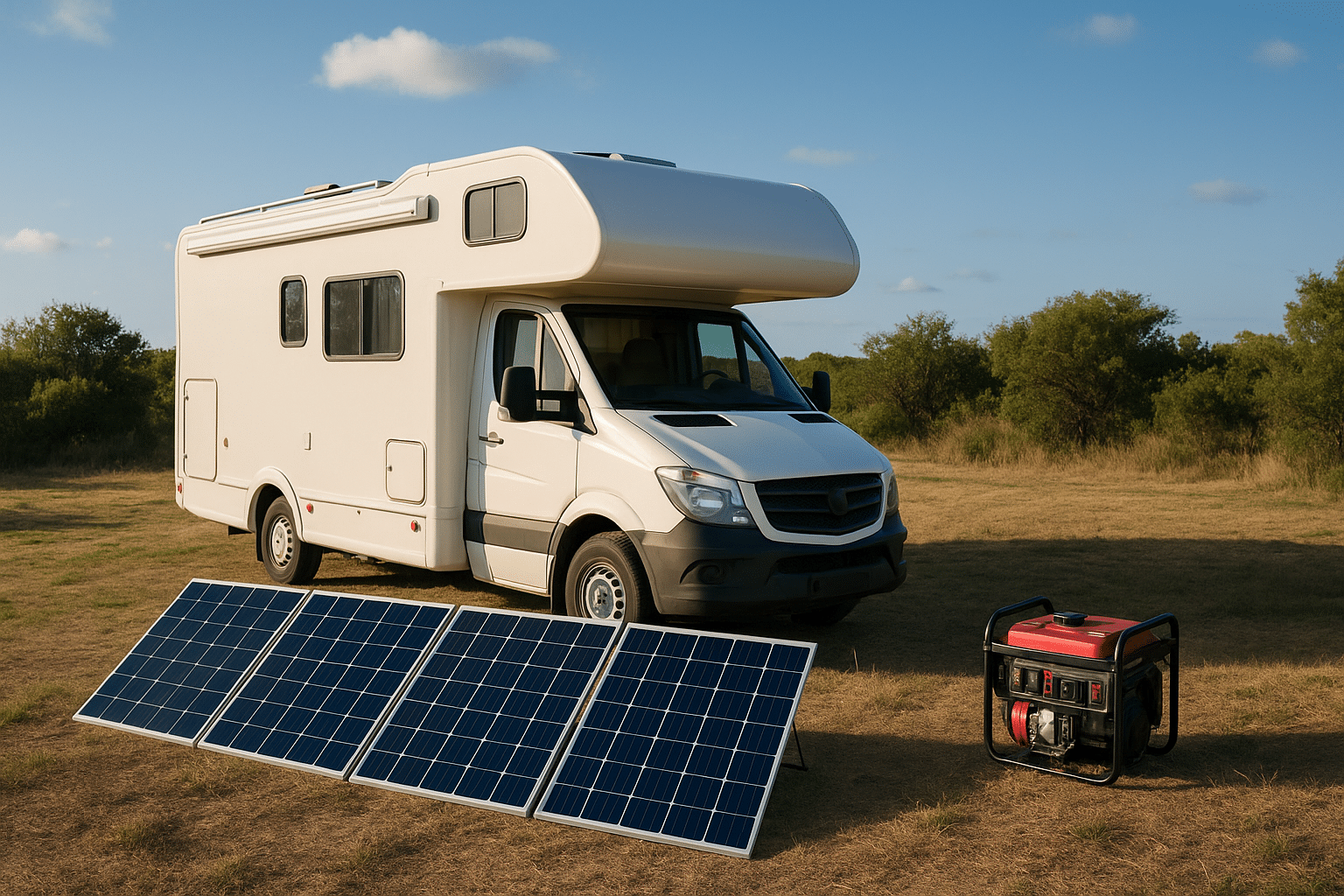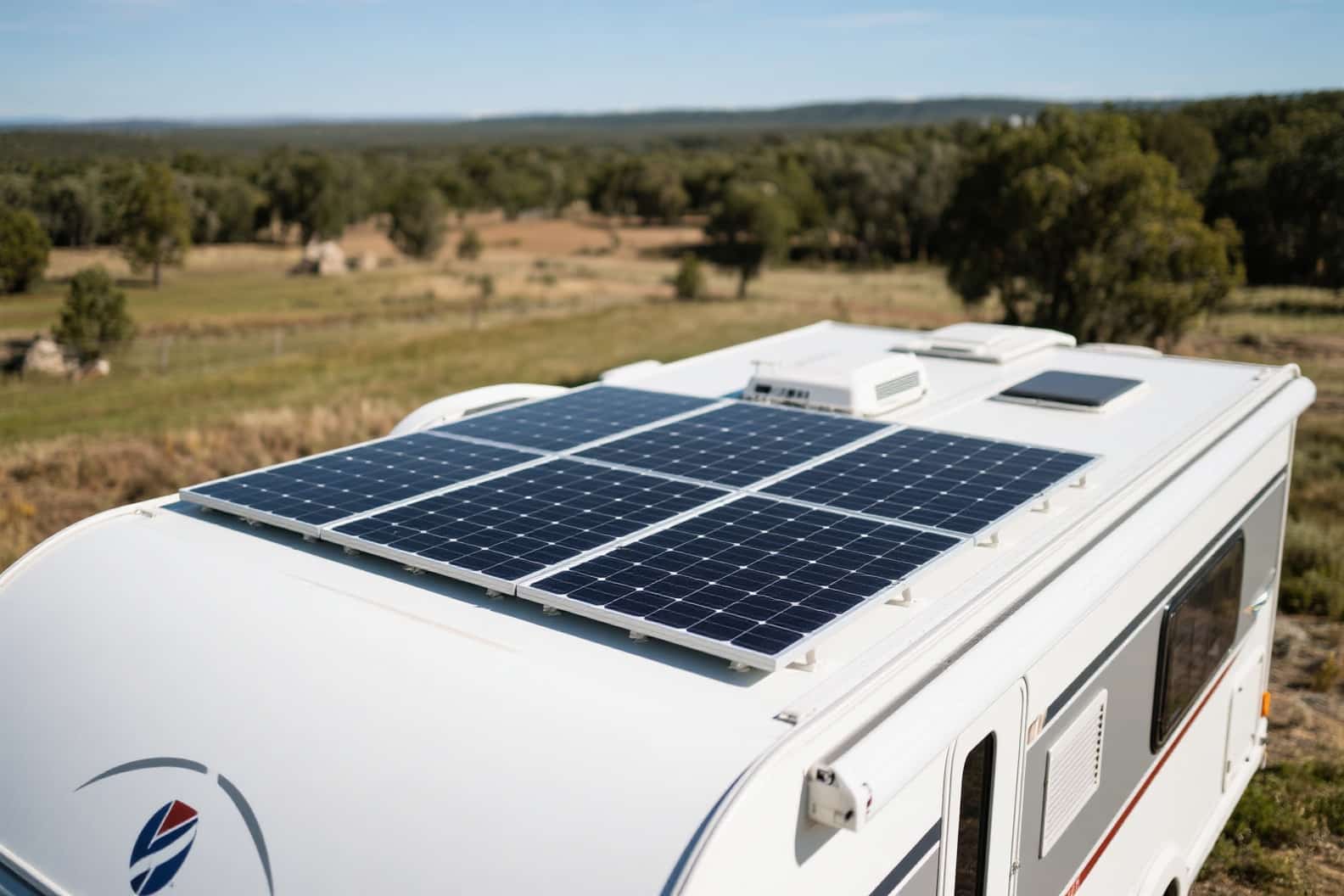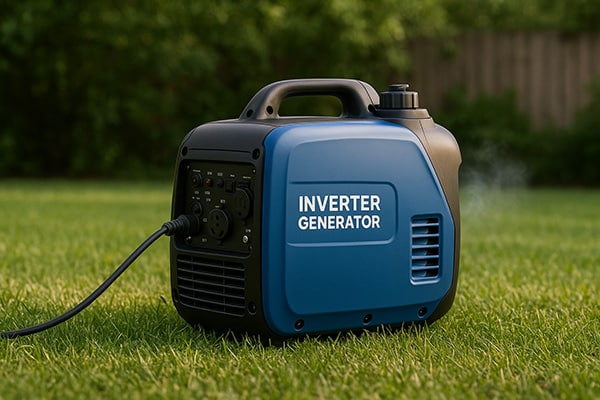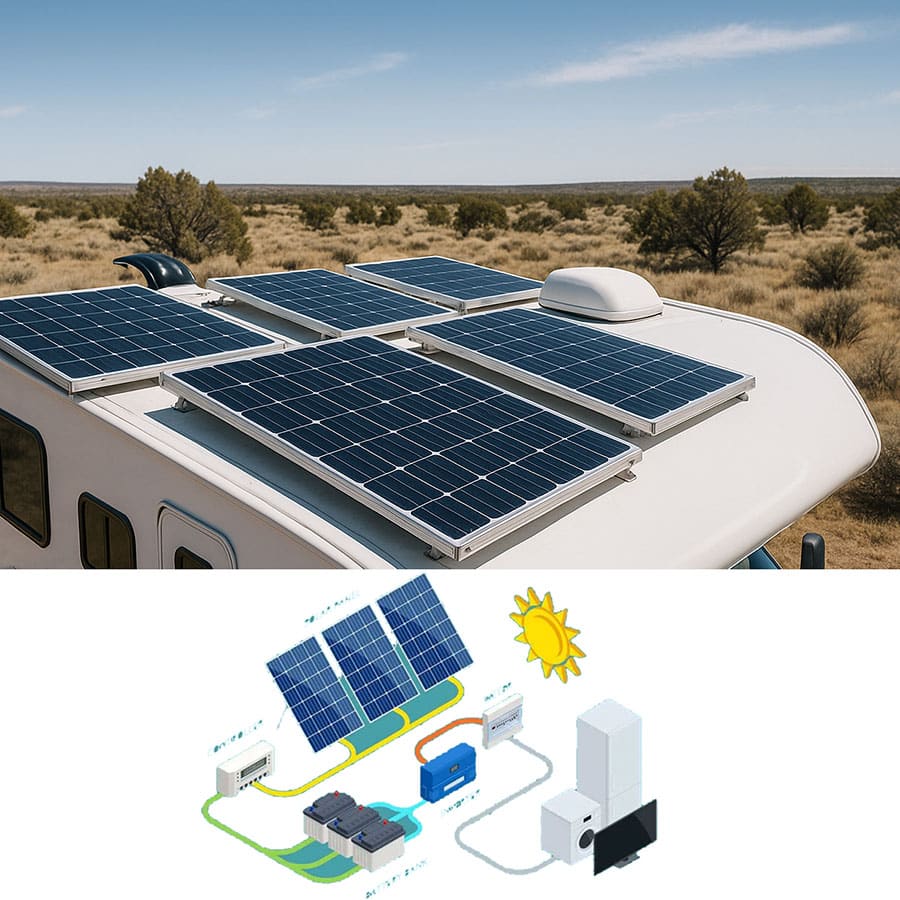Struggling to power your RV adventures? Wondering if solar panels or a generator is the smarter investment? I'll help you decide.
For long-term value, generators are generally more cost-effective. While solar offers green power, generators provide reliable energy at a lower overall cost, especially considering initial setup and battery expenses for solar.

Choosing the right power source for your RV is a big decision. It affects your comfort, your budget, and how you enjoy your travels. I've spent years in the generator industry1, from working in a factory to running my own business, and I've seen firsthand what works best for most people. Let's break down the key differences to help you make an informed choice.
Which is better for an RV, solar or generator?
Confused about RV power options? Solar seems green, generators seem reliable. Let's clear up which one truly serves your RV needs best.
Generators often prove better for RVs due to their consistent power output in all conditions and lower initial investment compared to a complete solar setup with sufficient battery storage for comparable power.

When I first got into RVing myself, and later as I advised clients, I was fascinated by the idea of silent, free power from the sun. Many of my clients, especially those new to RV power systems, ask me about this. But we need to look at the practical side for an RV.
Power Reliability and Consistency
A generator gives you power whenever you need it, rain or shine. If you're running an air conditioner, microwave, or other high-demand appliances, a generator won't flinch. I've seen this firsthand countless times with customers who need dependable power. Solar, on the other hand, is entirely dependent on sunlight. Cloudy days, shade from trees, or even the angle of the sun can drastically reduce its output. This means you might not have enough power when you need it most. [I remember one trip where a new RV owner, a client of mine, had invested heavily in solar. A surprisingly overcast week left them unable to comfortably run their air conditioning, wishing they had opted for a generator instead.] For consistent, on-demand power in an RV, a generator usually has the definite edge.
Upfront Costs vs. Practical Application
Here's a simplified look at how these power sources stack up for typical RV use. As someone who has sourced and sold many generators, these comparisons are front-of-mind for my business customers:
| Feature | RV Solar Panels | RV Generator |
|---|---|---|
| Initial Cost | Higher (panels, charge controller, inverter, batteries) | Lower (generator unit itself) |
| Fuel Source | Sunlight (free, but needs collection & storage) | Gasoline/Propane/Diesel (ongoing cost) |
| Power Output | Variable (weather, sun angle, panel condition dependent) | Consistent (delivers rated power reliably) |
| Maintenance | Panel cleaning, battery health checks, inverter/controller monitoring | Regular (oil changes, fuel, spark plugs, filters) |
| Noise | Silent operation | Can be noisy (though modern inverter models are much quieter) |
While solar has no direct fuel cost, the initial outlay for a system powerful enough to run common RV appliances, especially factoring in the necessary large battery bank for continuous or nighttime power, is significant. Generators provide that power capability right out of the box with a lower initial purchase price.
Is it better to get a generator or solar panels?
Weighing up generators versus solar panels for your power needs? It's a common dilemma I discuss often. Let's look at which offers a better overall deal for reliable power.
Generators often present a better overall package due to lower initial costs and consistent power delivery. Solar panels require significant upfront investment for panels and especially batteries, and are dependent on sunlight, making generators more practical for many users.

This question comes up a lot in my consultations, particularly when I'm talking to purchasing managers who are deciding on power solutions for RVs they sell or equip. People see the immense appeal of "free" energy from the sun. But "free" isn't always the full picture when you're equipping an RV for all conditions and all user expectations. When you're deciding, think about how your customers will actually use their power, day in and day out.
The Hidden Elephant: Battery Costs
The biggest financial hurdle for RV solar, and often the most underestimated, isn't usually the panels themselves. It's the energy storage system – the batteries. You absolutely need batteries to store the power generated during daylight hours for use at night, on overcast days, or when your power demand exceeds immediate solar generation.
- Lead-acid batteries: These are the traditional choice, appearing cheaper upfront. However, they are heavy, require regular maintenance (like checking and topping up water levels in flooded types), and have a shorter operational lifespan, typically 2-4 years depending on usage patterns and how well they are maintained.
- Lithium-ion (specifically LiFePO4) batteries2: These are the modern premium choice. They are much lighter per unit of energy stored, can last significantly longer (often 8-10 years or more), require virtually no maintenance, and can be discharged more deeply without damage, meaning you get more usable capacity. However, their upfront cost is substantially higher, often several times that of lead-acid for the same capacity.
I've seen clients, and have discussed with fellow industry professionals, how end-users must invest thousands of dollars in a sufficiently large lithium battery bank to make their solar system truly usable for more than just basic lighting and phone charging. This battery cost frequently eclipses the price of a good quality portable generator. For instance, a reliable 3000-watt inverter generator might cost between $800 and $1,500. A solar setup with enough panels and lithium batteries to reliably run similar appliances, like an RV air conditioner for a few hours, could easily push past $4,000 to $7,000, and sometimes much more depending on the desired autonomy. This is a crucial factor many overlook. [I recall a product manager I've worked with for years who was tasked with specifying a solar package for a new luxury RV line. The bill of materials for the battery bank alone, to meet the expected power needs of luxury users, made the final RV price point challenging in the market.]
Operating Conditions and Real-World Limitations
Generators are workhorses; they perform in almost any weather. Rain, dense clouds, even snow – you turn the key or pull the cord, and you have power, assuming you have fuel. Solar panels, however, have very specific operational requirements. They need direct, strong sunlight to perform at or near their rated capacity.
- Shade: Parking under trees for coolness or in a tightly packed campground spot with adjacent RVs casting shadows? Your solar output will plummet dramatically.
- Angle & Time of Day: The sun's angle changes constantly throughout the day and seasonally. Flat-mounted RV panels are rarely at the optimal angle for maximum energy harvesting, especially in early mornings, late afternoons, or during winter months when the sun is lower in the sky.
- Dirt, Dust & Debris: Panels need to be kept clean. A layer of road grime, dust, leaves, or bird droppings can significantly reduce their efficiency. This means regular cleaning is part of the upkeep.
This means solar isn't always a "set it and forget it" solution if you, or your customers, need dependable, substantial power. It requires more careful planning regarding parking, orientation, and often, more compromise on when and how much power can be used.
Are solar panels for an RV worth it?
Dreaming of silent, eco-friendly power with RV solar panels? Many do. But are they truly worth the investment when all factors are considered? Let's investigate the real value.
RV solar panels can be worth it for specific uses like trickle charging batteries or powering minimal loads. However, for substantial, consistent power, the high upfront cost (especially batteries) and sunlight dependency often make generators a more practical and cost-effective choice.

"Worth it" is always a key question for any purchasing manager evaluating product options, or for an end-user making a significant investment. From my years in the generator business, spanning roles from factory floor insights to international trading, I've learned to look at the total value proposition, not just one aspect. RV solar panels can be worth it for very specific, limited applications. For instance, a small 50W or 100W panel to trickle-charge the house batteries while the RV is in storage, or to power a few LED lights and a small vent fan when boondocking with extremely minimal power needs, can be a great, silent solution. Many new RVs now come with a "solar-ready" plug or small pre-installed panel for just this kind of small-scale use.
However, when we talk about powering an entire RV lifestyle—running air conditioners in the summer heat, using a microwave for quick meals, brewing coffee in the morning, watching TV, or powering essential medical devices—the financial and practical calculation changes dramatically.
Cost-Effectiveness & Longevity: The Real Numbers
Generators have fuel costs, that's undeniable. They also require periodic maintenance like oil changes, filter replacements, and spark plug checks. This is true. But as I've stressed based on my insights and experience, these ongoing operational costs are often far lower over a 5-10 year period than the capital replacement cost of a large, high-capacity battery bank needed for a robust solar system. Good quality LiFePO4 batteries might last 7-10 years, perhaps more if treated perfectly, but they represent a huge reinvestment when they eventually degrade and lose capacity. Cheaper deep-cycle lead-acid batteries will need replacing much sooner, possibly every 2-4 years depending on usage patterns, depth of discharge, and maintenance diligence. This adds significantly to the long-term expense and hassle of a solar-dependent system.
Here’s a more detailed comparison, keeping a purchasing manager's perspective in mind for overall product viability and customer satisfaction:
| Aspect | RV Solar Panels (for substantial power) | RV Generator (for substantial power) |
|---|---|---|
| System Cost/Rated Watt | Higher upfront cost per usable watt. This is due to panels, a high-quality MPPT charge controller, a powerful pure sine wave inverter, and especially the large, expensive battery bank. | Lower upfront cost per usable watt. The generator is the complete power source. |
| Energy Storage | Absolutely essential & typically the most expensive single component. Battery technology is improving, but high-capacity storage remains costly. | Not required for power generation itself. The fuel in the tank acts as the 'stored energy'. |
| Performance Reliability | Highly variable. Performance is directly dependent on sun intensity, angle of incidence, panel condition (cleanliness), cloud cover, and even ambient temperature (high temps can reduce efficiency). | Consistent and predictable. Delivers its rated power as long as it has fuel and is properly maintained. Works day or night, in almost any weather condition. |
| Fuel Costs | None for the sunlight itself. | Ongoing fuel cost (gasoline, propane, or diesel). However, this can be managed with efficient, modern inverter generator models that adjust engine speed to load. This cost is often still less than battery bank replacement costs spread over the system's life. |
| Maintenance Complexity | Panel cleaning is routine. Critical electronic components like MPPT charge controllers or large pure sine wave inverters can fail and are costly to replace. Diligent battery health monitoring and management are key to longevity. | Simpler, more traditional mechanical maintenance: Oil changes, air and fuel filter replacements, spark plug changes. Parts are widely available and generally less expensive. |
| Repair & Service | Can be specialized. If an advanced inverter or charge controller fails, it's often a full component replacement, potentially requiring a technician familiar with RV solar systems. Not easily user-serviced beyond basic connections. | More user-serviceable for many basic issues. There's a wider network of small engine repair shops capable of servicing generators. Parts are generally cheaper and more readily available. |
[A long-time client, who manages a large fleet of rental RVs, shared a valuable experience with me. They initially tried offering premium RVs equipped with extensive solar packages. However, they encountered significant challenges: the maintenance headaches associated with complex systems, user errors leading to premature battery damage (renters aren't always gentle or knowledgeable), and the sheer cost of ensuring truly reliable power for renters who expect amenities like air conditioning on demand. Ultimately, they reverted to equipping most of their fleet with reliable, easy-to-operate portable inverter generators.] They found generators were simpler for their diverse customer base to use and proved far more cost-effective to maintain and keep operational across a large, heavily used fleet.
So, while solar definitely has its niche for specific, low-power applications or for users with a strong preference for silent, green charging when conditions are ideal, for consistent, ample, and cost-effective RV power, a generator often provides better overall value and significantly less operational anxiety. This is especially true when you consider the total cost of ownership and reliability over many years of RVing adventures.
Conclusion
For most RVers needing reliable and substantial power, generators offer better long-term value and practicality compared to the higher costs and limitations of comprehensive solar panel systems.

